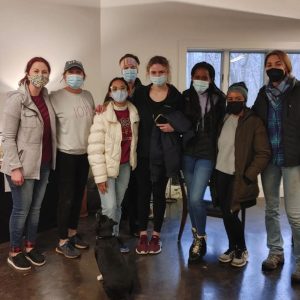
Social workers understand that engagement is an ongoing component of the dynamic and interactive process of social work practice with, and on behalf of, diverse individuals, families, groups, organizations, and communities. Social workers value the importance of human relationships. Social workers understand theories of human behavior and the social environment, and critically evaluate and apply this knowledge to facilitate engagement with clients and constituencies, including individuals, families, groups, organizations, and communities. Social workers understand strategies to engage diverse clients and constituencies to advance practice effectiveness. Social workers understand how their personal experiences and affective reactions may impact their ability to effectively engage with diverse clients and constituencies. Social workers value principles of relationship-building and inter-professional collaboration to facilitate engagement with clients, constituencies, and other professionals as appropriate.
Engagement with clients needs to be strategic. Social workers must understand how clients communicate and are mindful of the diversity among the population they are serving. As a service provider, workers must be able to adapt and be competent in the social behaviors a potential client may have. Social workers should recognize that our interpersonal skills and emotional intelligence affect the engagement we have with clients. Successful engagement is necessary in order to provide the best service to your client. There are many clients who have their own perception of social workers which causes them to have a lack of trust. Some clients need to be encouraged or reassured that they are a priority. As an introvert, I tend to be more reserved but if I come across a client who lacks trust I may have to step out of my comfort zone and build a connection with the client to truly understand what they need. Throughout this journey, I have been finding ways to become more flexible with changing my approach to customize the experience for my future clients.
Academic Evidence:
Below you will find a video recording of a psychotherapy group I facilitated for a course called Social Work Practice with Individuals and Groups taught by Dr. Annette Heck. This group focused on how we can combat our rock bottom moments by changing our perspectives. This video shows how I am able to engage with various personalities and make people feel heard within a group. Throughout the session, I reassured the clients that they are the priority and my agenda will adjust to their needs. This was the first time I facilitated a group so I was nervous going into this. After watching my video several times, I was able to note my strengths and weaknesses.
Field Evidence:
In my Junior year, I interned at Foundation House Ministries in Cleveland, TN. I worked on updating the resource list to filter out those that are no longer available. This task required me to connect with other agencies to verify their programs and how they can assist our clients. This type of inter-professional engagement allowed me to network and strengthen the skills needed to engage efficiently. Below is a link to the resource list I completed.
Community Service Evidence:

I had the opportunity to volunteer at Welcome Home Chattanooga. Welcome Home of Chattanooga creates a community of hope, healing, and compassion for those who are facing a serious illness or death and need safe shelter. In honor of Martin Luther King Jr. Day, I signed up to make clients a delicious home-cooked casserole. During this event, I also was able to engage with several of the residents and learn more about their personal stories. Above is a picture of me alongside members of the Psychology club who also took part in this meaningful experience.